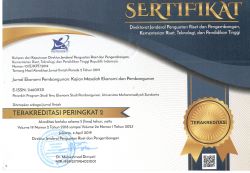Can a School Operational Assistance Fund Program (BOS) Reduce School Drop-Outs During The Post-Rising Fuel Prices In Indonesia? Evidence From Indonesia
Bayu Kharisma(1*)(1) Department of Economics Faculty of Economics and Business, University of Padjadjaran
(*) Corresponding Author
Abstract
This study aims to analyze the impact of school operational assistance fund program (BOS program) on the dropout rate during the post-rising fuel prices using Indonesian Family Life Survey (IFLS) and difference in difference approach. The results showed that the impact of BOS on the dropout rate of students aged 7-15 years during the period investigated in this study was lower than those who did not receive BOS fund, but it was not statistically significant. In the meantime, if the account of the research is to be limited to the influenc e of students aged 16-20 years who had previously received the benefit of BOS, it shows that BOS program had a positive influence to the dropout rates. However, children aged 16-20 years who had not previously received benefits BOS negatively affect the dropout rates. Based on this fact, the benefit of the BOS following the fuel price hike in Indonesia during the research period did not seem to be particularly effective in lowering the dropout rate.
Keywords
Full Text:
PDFReferences
Bank Indonesia. (2005). “Laporan Perekonomian Indonesia 2005”. Bank Indonesia.
Bertrand, M, E. Duflo & S. Mullainathan., (2004) “How much should we trust differences-in-differences estimates?”. Quarterly Journal of Economics 119 (1), 249–275
Borraz, F., & González, N. (2009). “Impact of the Uruguayan Conditional Cash Transfer Programme”. Latin American Journal of Economics, 46(134): 243–71
Cameron, L. (2002). “Can A Public Scholarship Program Successfully Reduce School Drop-Outs in a Time Of Economic Crisis? Evidence from Indonesia”. Dept of Economics. University of Melbourne.
Center of Data and Statistic for Education. (2008). “National Education Data Overview 2007/2008”. Ministry of National Education. Jakarta.
Dehejia, R et al. (2006). “Child Labor and Agricultural Shocks”. Journal Development Econonomics 81:80–96
Duflo, E. (2000). “Schooling and Labor Market Consequences of School Construction in Indonesia: Evidence from an Unusual Policy Experiment”. The American Economic Review.
ILO. (2006). “Pasar Tenaga Kerja Orang Muda Indonesia dan Dampak Putus Sekolah Dini serta Pekerja Anak”. Organisasi Perburuhan Internasional . Jakarta. 2006.
Khander, S.R., Koolwal, G.B., & Samad, H.A. (2010). “Handbook on Impact Evaluation, Quantitative Methods and Practices”. Washington DC: The World Bank
Majalah Pendidikan (2007). “Quo Vadis BOS”. viewed 20 January 2017 https://one1thousand100education.wordpress.com/2007/07/07/quo-vadis-bos/
Ministry of National Education. (2005a). “School Operational Handbook (BOS) Handbook for Free Education in a Nine Year Compulsory Learning Period”. 2005
Ministry of National Education. (2005b), “Strategic Plan Ministry of National Education 2005-2009”. Jakarta
Ponce, J & Bedi S.,A. (2010). “The Impact of a Cash Transfer Program On Cognitive Achievement: The Bono De Desarrollo Humano Of Ecuador”. Economics of Education Review 29 (2010) 116–125.Elsevier.
Shahidul, S.M & Karim, A.H.M & Zehadul. (2015). Factors Contributing To School Dropout Among The Girls: A Review Literature. European Journal of Research and Reflection in Educational Sciences. Vol. 3 No. 2. 2015.
SMERU. (2006). “Kajian Cepat PKPS-BBM Bidang Pendidikan: Bantuan Operasional Sekolah (BOS) 2005”. Jakarta
Sparrow, R. (2004) “Protecting Education for the Poor in Times of Crisis: An Evaluation of a Scholarship Program in Indonesia”. SMERU Working Paper. October 2004
Strauss, J et.al (2009). “The Fourth Wave of The Indonesia Family Life Survey : Overview and Field Report. Volume 1”. RAND Labor and Population Working Paper Series.
USAID. (2006). “Apa yang sedang dikerjakan di Tingkat Nasional untuk Memastikan Semua Kaum Muda Indonesia yang Menyelesaikan Pendidikan Dasar?. Laporan Penelitian Tingkat Putus Sekolah di Tingkat Nasional.USAID : Decentralizaed Basic Education 3 : Life Skills for Youth
Article Metrics
Abstract view(s): 1119 time(s)PDF: 524 time(s)
Refbacks
- There are currently no refbacks.
















